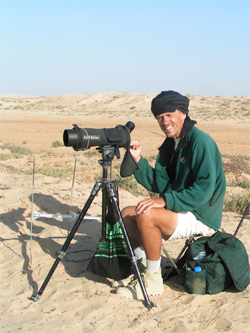Struggle for safety. Adaptive responses of wintering waders to their avian predators

PhD ceremony: Mr. P.J. van den Hout, 13.15 uur, Academiegebouw, Broerstraat 5, Groningen
Title: Struggle for safety. Adaptive responses of wintering waders to their avian predators
Promotor(s): prof. T. Piersma
Faculty: Mathematics and Natural Sciences
Raptors appear to affect shorebirds mainly through behavior, rather than through consumption, concludes Piet van den Hout in his thesis. He examined the impact of predators (e.g. falcons) on populations and individuals of non-breeding shorebirds. Field observations at Banc d’Arguin, Mauritania, suggest that consumptive effects are minor. However, vulnerability is biased. Individuals that - through feeding specialization or inability - forage in nearshore area are most vulnerable, as attack intensity and lethality are highest here. Inept foragers may be evicted from safe places. Yet, they learn: with age Red Knots increase foraging in safe area. It is proposed that safety from predators is best warranted by the development of abilities in foraging and competitiveness that enable birds to optimize energy state, through which they can afford to forage and rest at times, places and with enough flock mates so as to minimize predation risk. For good foragers, the protection that flockmates may provide in terms of risk dilution and shared vigilance may outweigh the disadvantages of competitiveness during foraging.
Shorebirds anticipate danger also by changes in body composition. Ruddy Turnstones, increased pectoral muscle when confronted with a model raptor. Red Knots, in a similar experimental setup, responded with body mass decrease. We propose these differential responses fit their ecologies: Turnstones are nearshore foragers that are confronted with raptors at close range. This calls for rapid accelerating escape (hence they should boost flight output by increasing pectoral muscle). Red Knots generally avoid shorelines. They can anticipate attack en gain speed before the raptor arrives. Then (flockwise) swerving is most effective (body mass decrease facilitates sharp turns).
| Last modified: | 24 August 2021 09.06 a.m. |
More news
-
21 November 2024
Dutch Research Agenda funding for research to improve climate policy
Michele Cucuzzella and Ming Cao are partners in the research programme ‘Behavioural Insights for Climate Policy’
-
13 November 2024
Can we live on our planet without destroying it?
How much land, water, and other resources does our lifestyle require? And how can we adapt this lifestyle to stay within the limits of what the Earth can give?
-
13 November 2024
Emergentie-onderzoek in de kosmologie ontvangt NWA-ORC-subsidie
Emergentie in de kosmologie - Het doel van het onderzoek is oa te begrijpen hoe ruimte, tijd, zwaartekracht en het universum uit bijna niets lijken te ontstaan. Meer informatie hierover in het nieuwsbericht.
